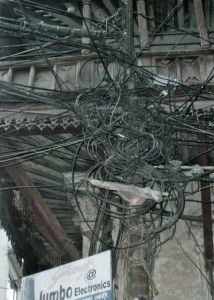Last night I was privileged to be in the audience as Elizabeth Hay gave a talk entitled “Sounds and Voices”. Ostensibly she was reading from and talking about her novel, Late Nights On Air, which is set in Yellowknife in the mid ‘70s, a time when Hay herself was living in Yellowknife and losing and finding herself in her first job with the CBC as a late night radio personality. Thirty years later she sat down to write a novel about shyness (she was painfully shy herself) and how it is overcome and how one’s place, alone in a tiny radio booth or alone out on the seemingly endless and empty tundra, can bring a shy person out of themselves. I’ve been lucky enough to see Hay in front of an eager audience of writers and readers twice previous and on those and this occasion she was riveting. She speaks in soft, measured tones, thoughtful and sincere and undoubtedly wise. Whether she is reflecting on her writing process, reading an excerpt from one of her novels, or responding to a question from the audience, she seems to be entirely present, gifting us with her full attention and concern. It would be hard, I think, not to come away with increased admiration for her, and that has been my experience every time.
Through anecdote and excerpt, Hay traced her early inspiration and motivation for writing the novel. She gave an amusing account of the transformation of the title, which did not settle upon its final version until the weeks leading up to publication. “Titles,” she said, “always seem inevitable once they’ve been settled upon a work and it has been read by many people. But it isn’t the case.” Hay is gently self-deprecating but evidently filled with the strength of spirit necessary to persevere, a talent she believes all writers need. In the end, she noted echoing Graham Greene, it’s all a question of the work, doing the work, and continuing to do the work.
I remember reading Late Nights On Air five years ago, the first of Hay’s works that I had encountered, and being immediately taken with it. It carried such a clarity of vision, both emotional and scenic, but it was the narrative voice that ultimately secured my allegiance. Not surprisingly the novel opens with a man hearing a disembodied voice on the radio late one night and falling in love. There is an intimacy, a narrative closeness, that sometimes takes hold in Hay’s writing. I’m thinking here especially of Garbo Laughs, but it can also be seen in Alone in the Classroom and Small Change. It isn’t something that I encounter in many writers and I wish could have had the courage to ask her about it during the question period or during the reception that followed the event. Unfortunately it isn’t something that I’ve been able to fully articulate myself yet, and one does not wish to appear tongue-tied in front of one’s heros.
I’m always fascinated by the writerly process. Hay says that she is as well and thus does not turn aside such questions. She says she needs a quiet room, a room she loves to go to. She rises and writes early in the morning preferring no encounters until after noon. She will usually begin by reading some poetry, perhaps something of Margaret Avison or Louis Glück, although she has recently been giving Wallace Stevens another try and finds she is getting something out of him this time. (Is it her love of poetry that explains the sometimes exquisite closeness of her narrative voice?) She’ll reread what she had written the day before making numerous changes and then set forth the continuance. She writes in longhand sitting in a large rocking chair with a plywood plank laid across the arms as her writing surface. If it was good enough for Virginia Woolf, she notes, it should be good enough for her. Later she will type what she has written into the computer and print it up for further editing.
Influences are often on an audience’s mind, perhaps naturally since clearly all of us have gladly been influenced by Elizabeth Hay’s writing. A further question on novelists she reads and admires led her to finish by enthusing about Penelope Fitzgerald, a writer whose work is so deceptively light, so perfectly paced and gently feathered that it is probably perfect. I couldn’t agree more.
Already I’m looking forward to Elizabeth Hay’s next novel which we were told would be out next spring. She wouldn’t tell us what it was about because there is still a great deal of work to be done on it, especially the ever difficult for her ending. And of course she couldn’t tell us the title because, well, that is no doubt subject to change.



 Sometime last autumn, I got the itch for change. As is typical for me, the itch was preceded by a rethink of my PIO, short for
Sometime last autumn, I got the itch for change. As is typical for me, the itch was preceded by a rethink of my PIO, short for 